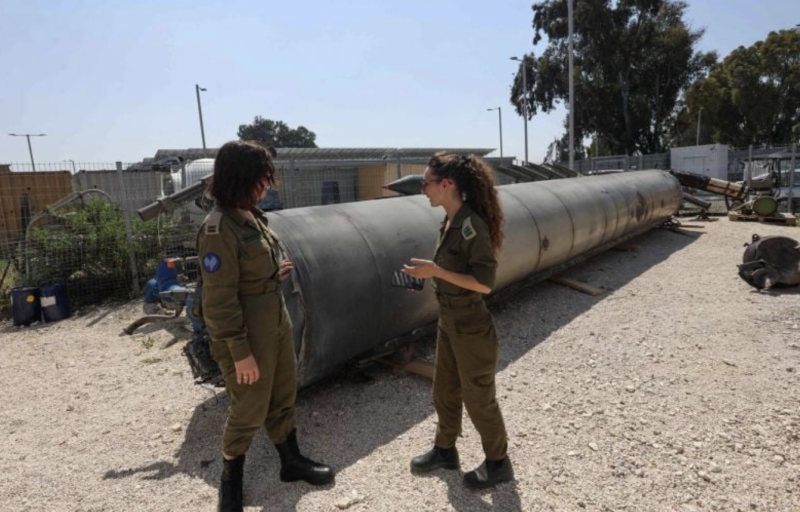
Female soldiers stand near an Iranian ballistic missile fired at Israel this weekend, at a military base in the south of the country, April 16, 2024. (Credit: Gil Cohen-Magen/AFP)
The Israelis have no choice but to respond, Defense Minister Yoav Gallant told his US counterpart Lloyd Austin on Sunday, Axios reported.
This referred to Iran’s unprecedented attack on Israel on Saturday evening in retaliation for the strikes against its consulate in Damascus on April 1. A senior official of the Islamic Revolutionary Guards Corp (IRGC) was killed in the strike.
Discussions within Israel’s war cabinet seem stormy: Far-right members pushed for a strong response, while the US and its Western allies urged Israel to avoid a regional conflagration. The response should emerge by the end of the week, analysts anticipated.
Tel Aviv reportedly assured Washington that its response would be calibrated to avoid an all-out war in the Middle East (as was Iran’s response). What are Israel’s options?
Strike Iran, and strike it violently
In order to restore its deterrence and redefine the red lines — including firing hundreds of drones, and ballistic and cruise missiles towards its territory — Israel is forced to take a firm stand.
“To create deterrence in the Middle East,” the country “should go berserk,” said ultra-nationalist National Security Minister Itamar Ben Gvir on Sunday. Targeting Iran’s strategic and energy infrastructures, or military sites selected in advance based on Israeli intelligence, would be one way to go.
Targeting Iran’s nuclear facilities, which were closed during Saturday night’s attack, would be the utmost response, but also the most risky. For years, Israeli Prime Minister Benjamin Netanyahu has been obsessed with the Iranian threat and Tehran’s nuclear program, which he has fought both diplomatically and in a shadow war against Iran.
War cabinet members Benny Gantz and Gadi Eisenkot — who are usually considered more moderate — suggested on Saturday an immediate response after firing the projectiles. However, Benjamin Netanyahu reportedly hit the brakes on their suggestion.
The US had previously asked its ally to be informed in advance of any planned response and made it clear that it would not take part in a counter-offensive against Iran. While Iran’s nuclear facilities are deep underground, targeting them effectively would require US assistance.
Nevertheless, Washington is firmly committed to Israel’s defense and believes that a major strike on Iranian soil could provoke further missile and drone strikes, and thus a regional war that the White House intends to avoid. Hence, it urged Israel to “be careful and strategic,” Axios reported.
Some pointed to the risk of oil market destabilization. Iran has warned that it will now respond to any Israeli attack on its interests. Also, the defense coordination in the face of an unexpected attack may not prove as effective as on Saturday evening, when almost all the projectiles were destroyed.
Back to the shadow war
To calm things down, Netanyahu told Likud party’s ministers that he was “determined to respond,” but the action would be “sensible and not something irresponsible,” a source close to the matter told The Wall Street Journal (WSJ).
Israel would likely avoid Iranian civilian and economic sites, Sima Shine, head of the Iran program at the Institute for National Security Studies, told WSJ.
Netanyahu’s stance could suggest a return to the confrontation that has been played out for decades between the two enemies, and which is based on cyberattacks, sabotage, assassinations, targeted attacks and the seizure of ships.
Israeli operations in this direction have often been carried out on Iran’s territory. This includes the assassination in 2020 of Iran’s top nuclear scientist Mohsen Fakhrizadeh, or the shutting down of almost 70 percent of the country’s fuel distribution network in December 2023 after a cyberattack attributed to Israel.
This shadow war has intensified since Oct.7, with Israel targeting senior members of the “Axis of Resistance” in Syria and Lebanon. Israel could thus multiply strikes aimed at further weakening the command structure of the Iran-aligned network in the region, claiming responsibility for these attacks, although it rarely does.
To mark the occasion, it could broaden its range of strikes by striking Iran’s interests in Yemen or Iraq. This would nevertheless put the US at a disadvantage, as it would be Israel’s first line of defense.
Other analysts pointed to new attacks on Iranian diplomatic buildings, which could provoke a strong reaction from Tehran, as Saturday’s barrage came in response to similar strikes.
In the meantime, a diplomatic response
The diplomatic option seems unlikely, given the domestic pressure placed on Israel. But the government may be persuaded by its allies, after the call for a UN emergency meeting on Sunday with the US, France and Britain — who helped defend Israel on Saturday night — calling for restraint to avoid a regional conflagration.
“It’s time to think with head as well as with heart,” British diplomat David Cameron told the Israelis.
Presented as a military victory, Israel’s defensive operation is also a major political gain for an executive that was until recently isolated on the international stage for its conduct of the war in Gaza. A G7 meeting that the US convened discussed the possibility of imposing sanctions on the IRGC. Tel Aviv could capitalize on this dynamic to relegate the war in the enclave to the background.
Some analysts believe that Israel’s deterrence power will be more easily restored with a rapid response. However, Israel could opt for restraint, which it had already done in 1991 under US pressure when Iraq initiated the Scud missile attacks.
The latter may only be temporary. While Tel Aviv believes that Iran and Gaza can be dealt with separately, they are politically linked. Israel’s determination to carry out the Rafah operation — against which its Western allies and Arab partners warned — could undermine the US cooperative efforts in the region to ensure Israel’s defense, particularly towards Arab countries.
This article was originally published in L'Orient-Le Jour. Translated by Joelle El Khoury.